Are you looking to head out on your new golf cart? Before you take your first trip, you should familiarize yourself with Nevada’s laws regarding what is legal and what isn’t while operating a golf cart. Though golf carts aren’t high-speed vehicles and are usually seen as low-risk, there can be substantial legal penalties for not following these laws. 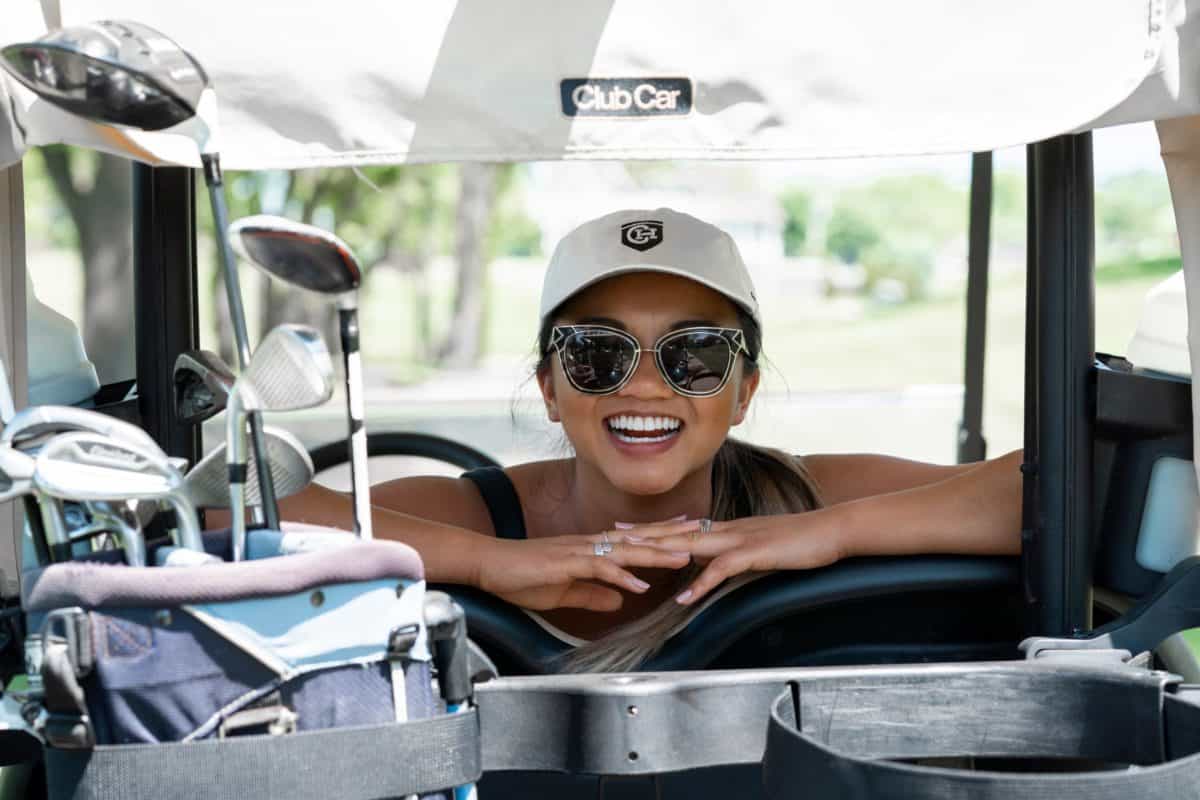 Any Las Vegas injury attorney would likely say that golf carts are sometimes more of a threat than passenger cars because people treat them as a different vehicle class. It can get even dicier when the cart is “modified” to go at higher speeds than it should. If you’re wondering about the risks involved in operating modified vehicles, check out our post on what to do if a defective car part caused a Las Vegas car accident.
Any Las Vegas injury attorney would likely say that golf carts are sometimes more of a threat than passenger cars because people treat them as a different vehicle class. It can get even dicier when the cart is “modified” to go at higher speeds than it should. If you’re wondering about the risks involved in operating modified vehicles, check out our post on what to do if a defective car part caused a Las Vegas car accident.
Nevada offers a range of golf courses and outdoor areas that can be a great deal of fun to explore in a golf cart or other low-speed vehicles. However, it can also be essential to keep the laws of the state in mind when using one of these vehicles to get around, especially if a crash is involved. You may also wonder about the laws involving golf carts in Nevada if a negligent low-speed vehicle driver has injured you.
Nevada State Law and Federal Law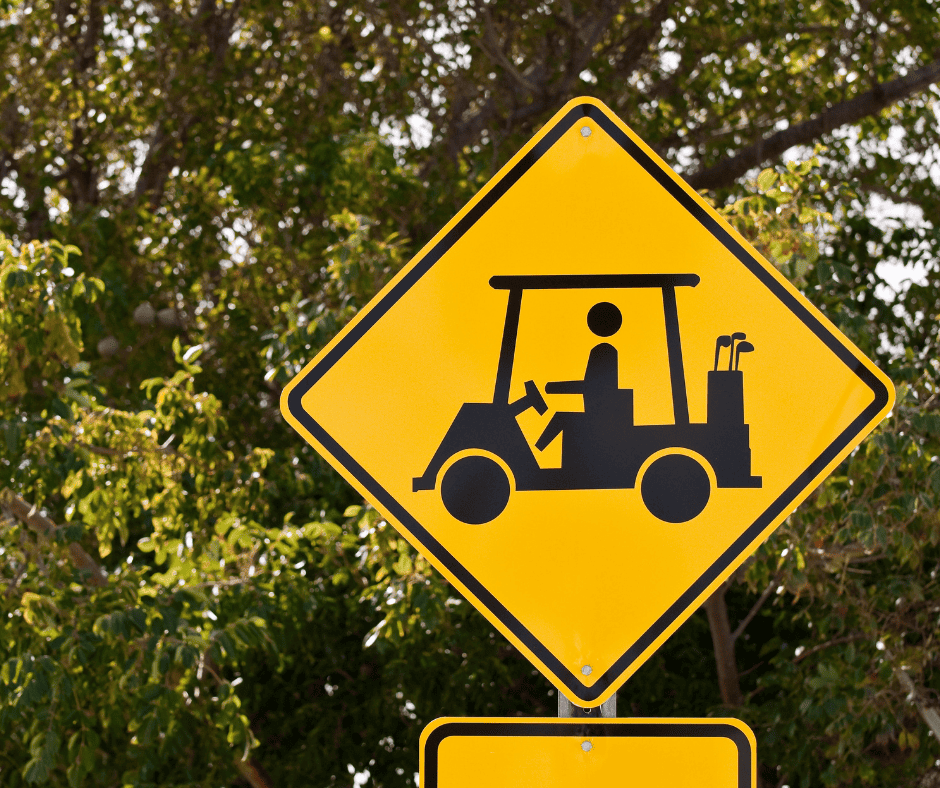
Nevada state law and local regulations govern the operation of golf carts and related vehicles, so long as they are not capable of going faster than 20 mph. However, if your golf cart was manufactured to exceed that speed, federal law classifies it as a motor vehicle. This means that it must have specific mandatory safety equipment, including parking brakes, rear-view mirrors, windshields, seat belts, headlights, stop lights, and turn signal lights. Local areas can also designate specific roads where golf carts may be legally driven. If you have been injured in a crash with a golf cart or similar vehicle, you can turn to an injury attorney Las Vegas for more details about the laws that apply in your case.
How Does Nevada Classify Golf Carts?
Nevada state law differentiates between Low-Speed Vehicles (LSVs) and golf carts. As defined by state law, a golf cart is a vehicle that can carry a minimum of three people, including the driver whose design is intended to carry golf equipment around. However, the driver need not transport golf equipment in the vehicle to legally operate it. Unfortunately for those with modified golf carts, the law stipulates that the maximum speed on level, flat surfaces should be between 20 mph and 25 mph. If it can go faster and an officer sees it, it will be considered a standard vehicle being unlawfully operated on a highway.
Golf Cart Requirements in Nevada
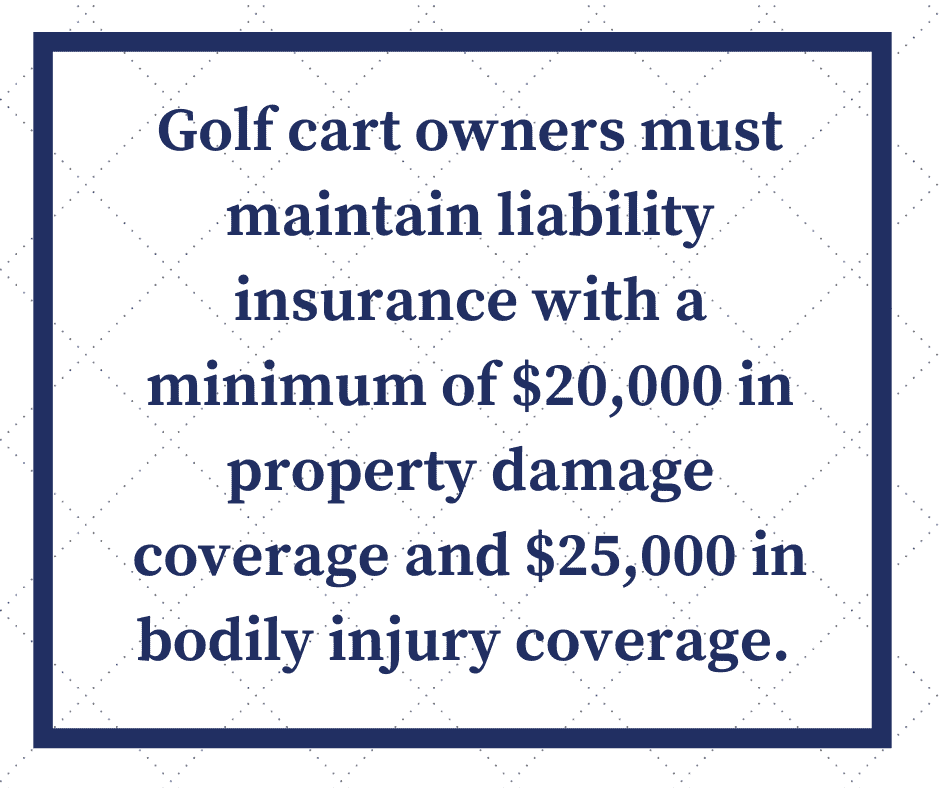 In Nevada, golf carts are not automatically required to be registered. However, if the county where the golf cart is located has a population of 700,000 or more, you need a Nevada golf card permit to operate the vehicle. Also, golf cart owners must have their vehicles inspected at an official DMV VIN inspection station, and the owner must present a valid Nevada Evidence of Insurance Card. In these same counties, golf cart owners must maintain liability insurance with a minimum of $20,000 in property damage coverage and $25,000 in bodily injury coverage. The state also requires that golf carts have headlights, tail lights, reflectors, stop lights, a mirror, brakes, and a placard or emblem declaring them to be slow-moving vehicles.
In Nevada, golf carts are not automatically required to be registered. However, if the county where the golf cart is located has a population of 700,000 or more, you need a Nevada golf card permit to operate the vehicle. Also, golf cart owners must have their vehicles inspected at an official DMV VIN inspection station, and the owner must present a valid Nevada Evidence of Insurance Card. In these same counties, golf cart owners must maintain liability insurance with a minimum of $20,000 in property damage coverage and $25,000 in bodily injury coverage. The state also requires that golf carts have headlights, tail lights, reflectors, stop lights, a mirror, brakes, and a placard or emblem declaring them to be slow-moving vehicles.
Who Can Operate a Golf Cart in Nevada?
Though localities in Nevada can set specific rules and roads on which golf carts can be operated, the state’s rules on who can operate a cart aren’t terribly stringent. Of course, no intoxicated person can legally operate a golf cart. The penalty for a “golf cart DWI” is identical to the penalty for a DWI in a passenger car. To understand your obligations after a vehicle accident, be sure to know the state laws, especially if an accident occurs involving a golf cart or other low-speed vehicles. Those with active driver’s licenses can generally operate golf carts in Nevada. So long as you’re not in a county with a population of over 700,000, it’s during the day, and you’re obeying any city or county rules, your driver’s license and a “low-speed vehicle” emblem make you good to go in most cases.
Understanding Low-Speed Vehicles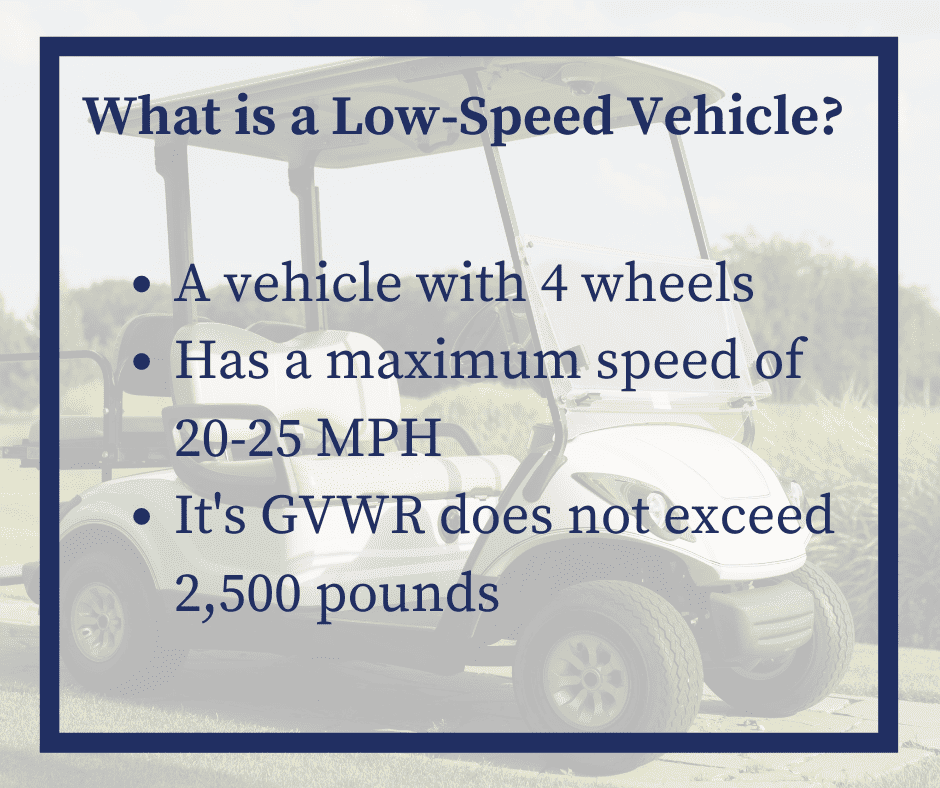
Low-speed vehicles or LSVs may look like golf carts, but they are subject to stricter regulations and are capable of higher speeds: up to 25 mph. They are subject to the same requirements for insurance, taxes, and emission inspections as other motor vehicles on Nevada roads, and they are issued standard license plates. If you’re in an accident involving a low-speed vehicle or suspect defective equipment, check out our post on navigating accidents due to car defects.
Do I Need to Register My Vehicle?
Generally, you don’t need to register your golf cart and get a permit in Nevada. Those who aren’t required to register also aren’t legally obligated to purchase insurance and pass formal inspection. The only exception is if you’re in a county (not a city) with more than 700,000 people. In this case, you will need to apply for a permit for the golf cart. It must have every feature that other street-legal vehicles have if you’re required to register it, like headlights, turn signals, and more. In order to register and get a permit, you must have proof of insurance that meets minimum state standards. Finally, you’ll need to have it pass inspection just like it were a passenger vehicle to successfully register a golf cart.
Where Can I Drive a Golf Cart in Nevada?
This question is often asked at a Las Vegas law firm too late. Notably, Nevada state law distinguishes counties with a population of at least 700,000 and counties with lower populations. Of course, this is primarily to ensure that those living in more rural areas can take advantage of less traffic and more space. If you do live in a county with 700,000 or more people, you will need to go through everything required to operate a car on public roads. This includes a DMV permit and standard insurance. For more details about car accident statistics in Nevada and how to stay safe, you can read more in our comprehensive guide.
Do DWI/DUI Laws Apply to My Golf Cart?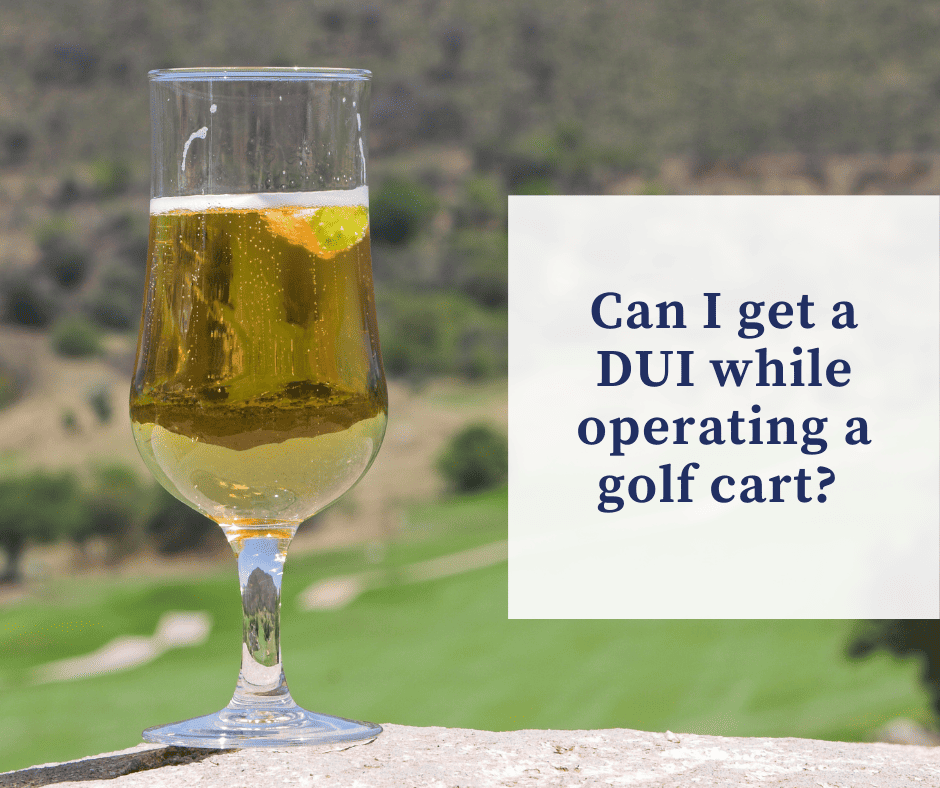
As any law office Las Vegas would know, Nevada state law treats driving a golf cart while under the influence of alcohol, cannabis, or illegal drugs to be the same offense as driving a standard vehicle. Additionally, drinking while operating the vehicle is still unlawful. These laws apply regardless of the population of the county in which you live. Essentially every motor vehicle law the state has applied to the golf cart, there is just a small exception carved out for registration and insurance purposes as enumerated earlier.
What Happens If I’m In A Golf Cart Accident?
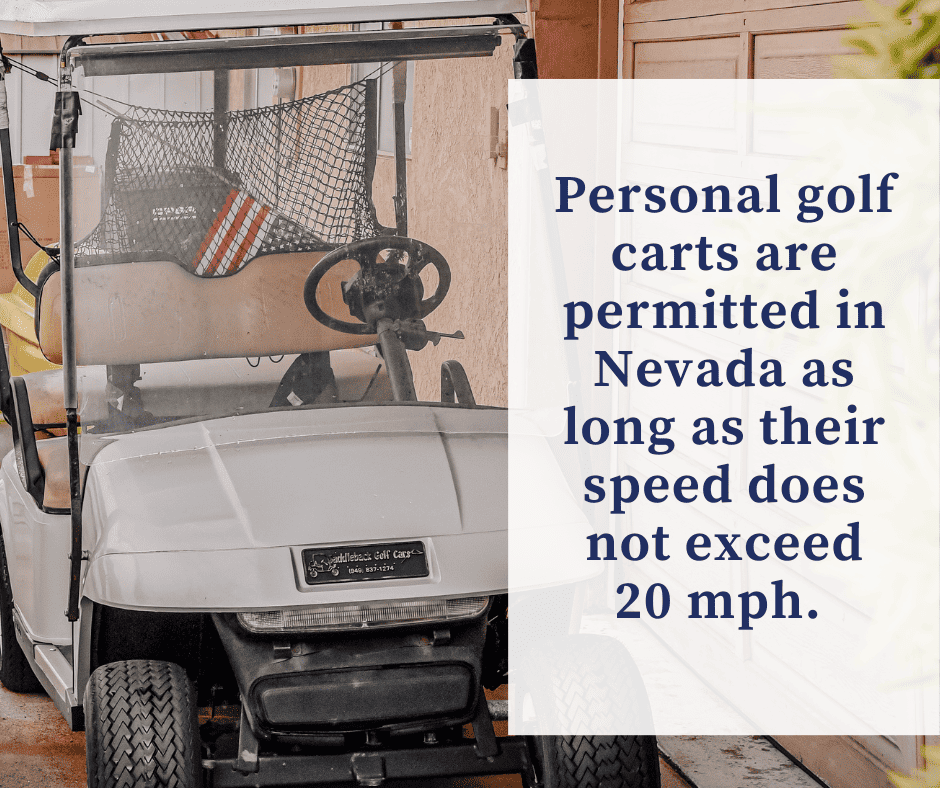 Though golf cart accidents may not sound serious, they can result in severe injuries. Especially if one or both parties were intoxicated or operating the vehicle at dangerous speeds, they can be devastating. Nevada treats golf cart accidents similarly to car accidents. Just like with car accidents, there will be a process to determine the at-fault party. Even if you’re in a county of less than 700,000 people and aren’t required to have liability insurance, you could still be liable for significant damages if found at fault. If you’re ever involved in a golf cart or vehicle accident, it’s crucial to know how to properly document a car crash for future claims.
Though golf cart accidents may not sound serious, they can result in severe injuries. Especially if one or both parties were intoxicated or operating the vehicle at dangerous speeds, they can be devastating. Nevada treats golf cart accidents similarly to car accidents. Just like with car accidents, there will be a process to determine the at-fault party. Even if you’re in a county of less than 700,000 people and aren’t required to have liability insurance, you could still be liable for significant damages if found at fault. If you’re ever involved in a golf cart or vehicle accident, it’s crucial to know how to properly document a car crash for future claims.
Need Help With Nevada’s Golf Cart Laws?
Do you think you would benefit from talking to a Las Vegas injury attorney due to a recent accident involving a golf cart? The Schnitzer Law Firm has a law office Las Vegas where you can schedule your free consultation today! This Las Vegas law firm has plenty of experience in the field to assist you with any questions or worries you may have. It isn’t easy to reach out, but the firm can likely help you find some peace of mind by answering your questions. After your no-obligation consultation, it’ll be determined whether you have a court case or not. To get started today, you need to get in touch with us. You can use our on-page chatbox, our “Contact Us” page’s form, call 702-960-4050, or send us a brief email with your contact information at Contact@TheSchnitzerLawFirm.com. Our agents are standing by 24/7, so you won’t need to wait long to respond and schedule!
Updated 1/28/2021
